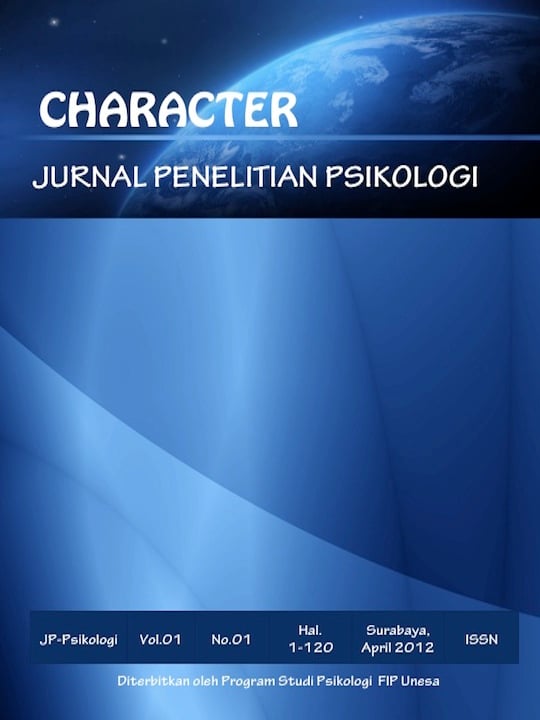HUBUNGAN ANTARA MENTAL TOUGHNESS DENGAN KECEMASAN OLAHRAGA PADA ATLET BELADIRI
DOI:
https://doi.org/10.26740/cjpp.v8i9.42043Abstract
Abstrak
Mental toughness mempunyai peranan penting dalam pencapaian prestasi atlet bela diri. Fungsi mental toughness yaitu untuk pertahanan diri atlet bela diri ketika menghadapi situasi yang sulit. Mental toughness memberikan motivasi dan perasaan positif, sehingga atlet bela diri mampu mengontrol dan menurunkan kecemasannya. Tujuan penelitian ini untuk mengetahui hubungan antara mental thougness dengan kecemasan olahraga pada atlet beladiri. Penelitian menggunakan metode kuantitatif korelasional. Teknik pengambilan sampel menggunakan sampel jenuh. Sampel yang digunakan yaitu terdiri dari 60 atlet pelajar beladiri terdiri dari cabang olahraga pencak silat, judo, karate, gulat dan anggar. Jumlah atlet pelajar beladiri terdiri dari 26 atlet pelajar perempuan dan 34 atlet pelajar laki-laki, dengan rentang usia 15-18 tahun.. Pengumpulan data menggunakan adaptasi skala mental toughness yang disusun berdasarkan Gucciardi et al. Sedangkan kecemasan olahraga menggunakan adaptasi skala Sport Anxiety Scale yang disusun berdasarkan Smith et al. Teknik analisis data menggunakan teknik korelasi product moment. Hasil penelitian menunjukkan tidak terdapat hubungan antara variabel mental toughness dengan kecemasan olahraga dengan nilai koefisien sebesar 0,105 dan taraf signifikansi 0,423 Atlet pelajar yang memiliki mental toughness pada situasi tertentu akan mengalami kecemasan olahraga.
Kata Kunci: Mental toughness, Kecemasan Olahraga, Atlet Beladiri
Abstract
Mental toughness has an important role in the achievement of martial arts athletes. The function of mental toughness is for self-defense of self-defense athletes when facing difficult situations. Mental toughness provides motivation and positive feelings, so that martial arts athletes are able to control and reduce their anxiety. The purpose of this study was to determine the relationship between mental thougness and sports anxiety in martial athletes. The research uses correlational quantitative methods. The sampling technique used a saturated sample. The sample used consisted of 60 student martial arts athletes consisting of pencak silat, judo, karate, wrestling and fencing sports. The number of student martial arts athletes consists of 26 female student athletes and 34 male student athletes, with an age range of 15-18 years. The data was collected using an adaptation of the mental toughness scale compiled based on Gucciardi et al. Meanwhile, sports anxiety uses an adaptation of the Sport Anxiety Scale which is based on Smith et al. The data analysis technique uses the product moment correlation technique. The results showed that there was no relationship between the mental toughness variable and sports anxiety with a coefficient value of 0.105 and a significance level of 0.423. Student athletes who have mental toughness in certain situations will experience sports anxiety.
Keywords: Mental toughness, Sports Anxiety, Martial Athletes
Downloads
Downloads
Published
How to Cite
Issue
Section
License
Authors who publish in this journal agree to the following terms:
Copyright in any article is held by the author.
The author grants the journal, publication rights with the work simultaneously licensed under a Creative Commons Attribution License that allows others to share the work with an acknowledgment of the work's authorship and initial publication in this journal.
Authors may enter into separate, additional contractual arrangements for the non-exclusive distribution of the journal's published version of the work (e.g., posting it to an institutional repository or publishing it in a book), with an acknowledgment of its initial publication in this journal.
Authors are permitted and encouraged to post their work online (e.g., in an institutional repository or on their website) prior to and during the submission process, as this can lead to productive exchanges, as well as earlier and greater citation of published work.
 Abstract views: 2040
,
Abstract views: 2040
, PDF Downloads: 2420
PDF Downloads: 2420





